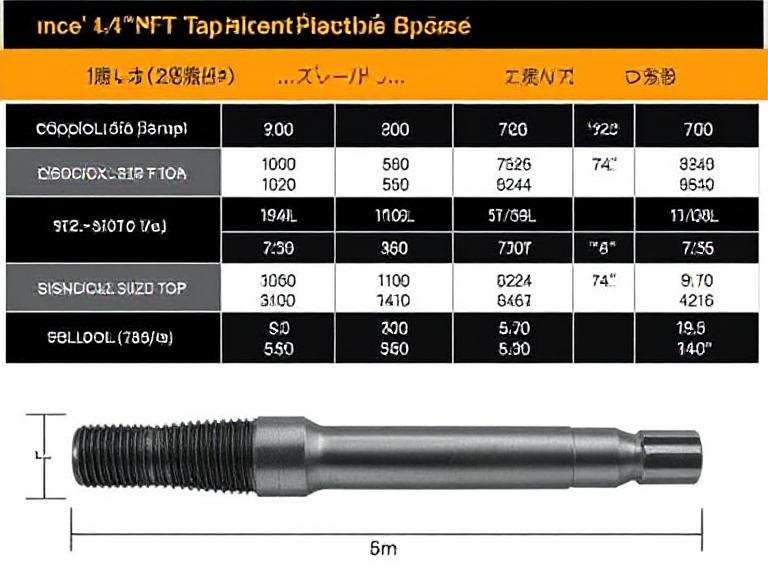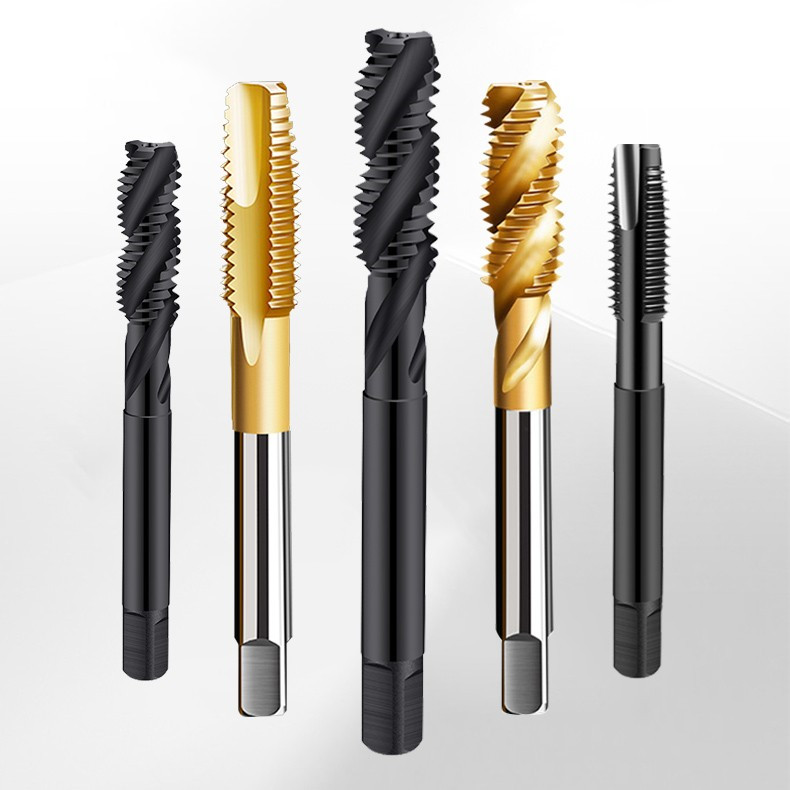
Table of Contents
- 1. What Is an NPT Thread Tap?
- 2. 1/4 NPT Thread Tap Dimensions Explained
- 3. NPT Standards and Measurement System
- 4. Common Applications of 1/4 NPT Threads
- 5. How to Select the Right 1/4 NPT Tap
- 6. About MisolGroup – Advanced Thread Cutting Tools
- 7. Summary Table of Key Dimensions
- 8. Frequently Asked Questions (FAQs)
- 9. References
1. What Is an NPT Thread Tap?
NPT stands for National Pipe Thread, a U.S. standard for tapered threads used on threaded pipes and fittings. The taper allows the thread to seal tightly, which is critical in fluid and gas systems. A 1/4 NPT tap is used to cut or repair internal threads on holes designed to fit 1/4-inch NPT male threads.
- Taper angle: 1°47’ per side
- Threads per inch (TPI): 18
- Standard: ANSI/ASME B1.20.1
These taps are designed to form a tight seal when used with compatible tapered pipe fittings, making them ideal for plumbing, pneumatic, and hydraulic systems.
2. 1/4 NPT Thread Tap Dimensions Explained
The 1/4 NPT tap has specific dimensional characteristics that ensure compatibility and sealing performance. Below are the primary measurements according to the ANSI B1.20.1 standard.
2.1 Basic Thread Specifications
| Specification | Dimension (inch) | Description |
|---|---|---|
| Nominal Pipe Size | 1/4 | Size designation for the thread |
| Threads per Inch (TPI) | 18 | Standard for NPT 1/4 |
| Pitch (in) | 0.0556 | Distance between threads |
| Thread Angle | 60° | Included angle of thread form |
| Major Diameter | 0.540 – 0.553 | Outer thread diameter range |
| Minor Diameter | 0.447 – 0.464 | Inner thread diameter |
| Taper per Inch | 1/16 | Standard NPT taper |
2.2 Drill Size for 1/4 NPT Tap
- Recommended drill size: 7/16” (0.438″)
- Taper length: Approximately 0.680”
- Hand tap length: Around 2.5”
Proper drilling and tapping depth are essential to ensure thread engagement and leak-free sealing when applying sealant or Teflon tape.
3. NPT Standards and Measurement System
NPT threads follow the American National Standard Taper Pipe Threads (ANSI B1.20.1). The standard specifies the thread angle, pitch, taper rate, and gauge dimensions to maintain consistency and interchangeability across manufacturers.
3.1 Why Taper Matters
The 1:16 taper ratio means that for every inch of thread, the diameter decreases by 1/16 inch. This taper creates an interference fit between male and female threads, forming a reliable pressure-tight seal.
3.2 Key NPT vs. NPTF Differences
- NPT: Requires thread sealant or tape for a leak-proof connection.
- NPTF (Dryseal): Designed for dry-seal fittings, eliminating the need for sealant in most cases.
4. Common Applications of 1/4 NPT Threads
The 1/4 NPT thread is extremely versatile and found across numerous industries. Its reliable sealing capability and compact size make it a popular choice for low- to medium-pressure systems.
- Automotive: Engine sensors, oil pressure fittings
- Hydraulics: Pneumatic valves, air compressors
- Industrial Machinery: Fluid connectors, manifolds
- Plumbing: Water lines, gas distribution systems
- Instrumentation: Pressure gauges and regulators
5. How to Select the Right 1/4 NPT Tap
Selecting a proper tap involves evaluating thread type, material compatibility, and tool geometry.
5.1 Consider Material Type
- High-Speed Steel (HSS): Best for general metal tapping.
- Cobalt Steel (M35): Ideal for high-temperature alloys.
- Carbide Taps: Suitable for hardened materials and long tool life.
5.2 Choose the Right Flute Design
- Spiral Flute Taps: For blind holes; efficient chip evacuation.
- Spiral Point Taps: For through holes; pushes chips forward.
- Straight Flute Taps: General purpose and cost-effective.
Tip: Always use tapping fluid for better surface finish and longer tool life.
6. About MisolGroup – Advanced Thread Cutting Tools

MisolGroup has been a leading Chinese manufacturer of thread cutting tools since 2005, integrating R&D, production, and sales for the global market.
6.1 Manufacturing Excellence
- Full in-house production with advanced CNC automation
- Vacuum heat treatment and precision testing facilities
- ISO-certified quality management system
6.2 Premium Material Selection
MisolGroup uses high-speed steels such as M35, DV3, and M2 to ensure durability and superior cutting performance across materials like carbon steel, stainless steel, and non-ferrous alloys.
6.3 Product Range
- Carbide Taps: Designed for high-speed applications and hard materials such as stainless steel and titanium.
- Nut Taps: Used for producing threads inside nuts or deep holes.
- Pipe Taps: Ideal for threading pipe fittings that require airtight or watertight seals.
- Spiral Flute Taps: Best for blind holes; they efficiently evacuate chips upward.
- Spiral Point Taps: Suitable for through-holes where chips can exit forward.
- Straight Flute Taps: Used for general-purpose threading in a variety of materials.
With nearly two decades of experience, MisolGroup serves global industries such as automotive, aerospace, electronics, defense, and mold manufacturing, providing reliable threading solutions that meet international standards.
7. Summary Table of Key Dimensions
| Parameter | Value | Notes |
|---|---|---|
| Nominal Size | 1/4 NPT | Pipe thread standard |
| Threads per Inch | 18 | ANSI B1.20.1 standard |
| Drill Size | 7/16 inch | Recommended pre-tap hole |
| Major Diameter | 0.540 – 0.553 in | External thread limit |
| Taper Rate | 1:16 | Ensures sealing fit |
| Thread Angle | 60° | Included form angle |
8. Frequently Asked Questions (FAQs)
Q1. What does 1/4 NPT mean?
It refers to a tapered thread standard used for pipes and fittings with a nominal size of 1/4 inch and 18 threads per inch.
Q2. What drill size should I use for a 1/4 NPT tap?
Use a 7/16” (0.438″) drill bit for best results and sealing performance.
Q3. Can I use 1/4 NPT with BSP threads?
No. NPT and BSP have different thread angles and pitches; they are not interchangeable.
Q4. What material is best for tapping stainless steel?
Cobalt steel or carbide taps are ideal for stainless steel due to their hardness and heat resistance.
Q5. Why use MisolGroup tools?
They offer ISO-certified, high-performance taps manufactured with precision CNC systems and premium materials for industrial reliability.


